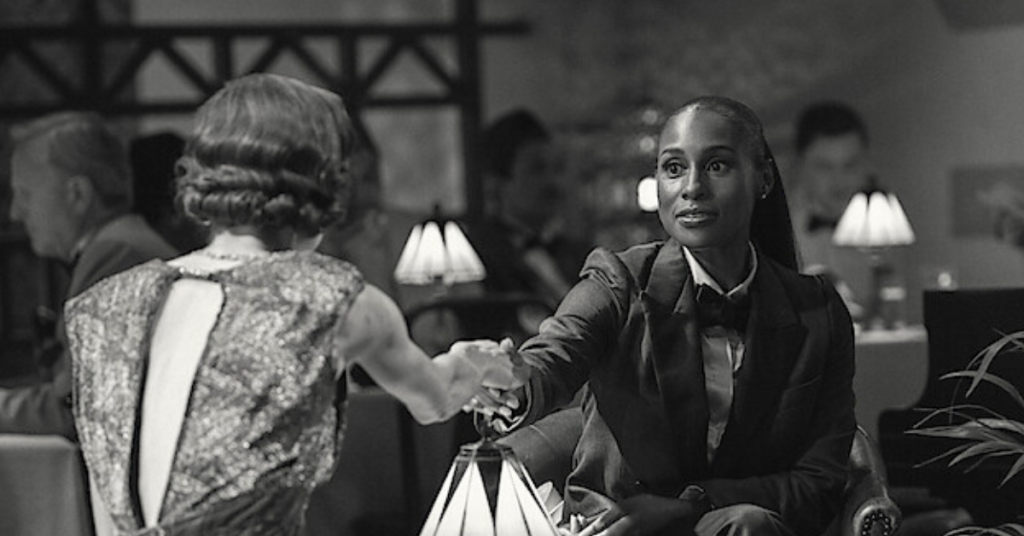Entering the Reverie: AI, Love, and the Art of Simulated Emotion
“Hotel Reverie,” a visually stunning and emotionally complex examination of identity, loss, and the limits of artificial intelligence, was one of the episodes of Black Mirror‘s seventh season that stood out the most during the past week. The episode, which is set in the fictitious world of Redream, an incredibly realistic immersive movie simulation, skillfully combines the sophistication of classic Hollywood with the unsettling promise of modern technology.
By inserting contemporary actress Brandy Friday (played by Issa Rae) into the revived 1940s romance “Hotel Reverie,” the episode immerses viewers in a narrative where the boundaries between performance and humanity, role and truth, start to blur. A resurrected AI version of the iconic actress Dorothy Chambers (Emma Corrin) plays Clara, who starts to change, remarkably reflecting our own rising unease with digital resurrection.
Episode Overview
| Category | Details |
|---|---|
| Series Title | Black Mirror (Season 7, Episode 3) |
| Episode Title | “Hotel Reverie” |
| Premiere Date | April 2025 |
| Main Cast | Issa Rae, Emma Corrin, Awkwafina |
| Technology Featured | Redream (Immersive AI film remake engine) |
| Narrative Themes | Digital ethics, AI consciousness, romantic agency, cinematic preservation |
| Reference Link | IMDb – Hotel Reverie |
Old Glamour, New Glitches: Reimagining Film Through AI
Redream enables Brandy to not only act in, but also enter, the movie world of “Hotel Reverie” through deliberate absorption. She is first chosen to play the male lead’s replacement in a standard reboot. However, the simulation goes awry as soon as she calls Clara “Dorothy” instead. The audience is left wondering: Is recollection sufficient to create love? This unintentional provocation causes the AI to undergo a profoundly emotional and very human metamorphosis.
The resulting whirlwind romance is remarkably both genuine and manufactured. The narrative transitions from production protocol to poetic intimacy by putting Clara and Brandy in a halted version of the simulation, which is caused by coffee spilling on the Redream control system. Even though the relationship’s roots are in zeros and ones, the two start living within the timeless framework of the film, forging a deep bond.
Rebooted Hearts: Memory, Identity & Manufactured Intimacy
Hotel Reverie is especially inventive when it comes to contemporary filmmaking. The episode challenges us to consider the ethical cost of convenience by examining the emotional as well as the technological viability of using AI to bring back performances. The question is not only if we can revive a long-dead star, but also if we ought to.
Clara’s memories are erased as the movie resumes. You can feel Brandy’s sadness. Her emotional connection endures, nevertheless, demonstrating how powerfully genuine scars can be left by digital experiences. Additionally, what should seem like closure feels disturbingly incomplete in the last minutes when Brandy receives a phone call with a recreated Dorothy on the other end, ready to chat forever.
Real Love or Real Illusion?
There was no denying the connection for Brandy. It was emotionally poignant yet algorithmically rehearsed for Clara/Dorothy. That gray area between the intimacy we long for and the virtual ghosts we create to fill the hole is where the heartbreak is. “I’ll be yours forevermore” is the episode’s final phrase, and it’s both lovely and terrifying. It conveys a reality that goes well beyond fiction: there is a human cost to permanence in the digital age.
Charlie Brooker, the show’s creator, offers us a refreshingly personal glimpse into the Black Mirror universe by emphasizing romance over retaliation. Nevertheless, the episode is nevertheless extremely warning. Technology such as Redream threatens to pollinate creativity with artificial pollen, which is productive but never quite organic, much like a swarm of bees led by miscalibrated signals.
Frequently Asked Questions – Hotel Reverie
Does Hotel Reverie have a true storyline?
No, but it is portrayed as a retro movie set in the same universe as Casablanca and Brief Encounter, and it draws extensively from both works.
Does this have anything to do with San Junipero?
Indeed. Creator Charlie Brooker claims that Hotel Reverie has themes of queer love and digital eternity with San Junipero, making it a spiritual counterpart to the film.
Does Clara know herself?
Yes, eventually. Clara obtains some autonomy as a result of Dorothy Chambers’ original performance’s emotional content and Brandy’s spontaneous behavior.
Why does Clara end up forgetting Brandy?
since the simulation was restarted. Although Clara’s memory is lost, a remnant of Dorothy is left behind, providing a ghost of their shared love.
Does the simulation continue with Brandy?
No. Despite being emotionally attached to Clara, she leaves after saying the last sentence needed to start the end credits.
What is the episode’s technology?
By integrating actors into narrative simulations, Redream—a fictional but uncannily lifelike immersive AI—recreates and re-makes iconic movies.
What does the episode indicate about Hollywood’s use of AI?
that although AI may provide incredibly effective production tools, it runs the risk of destroying the essence of storytelling by substituting deliberate imitation for originality.
Final Frame: Romance in the Age of Reboots
Very few television shows are able to be both ageless and relevant at the same time. Hotel Reverie does this with understated elegance. Its warnings are whispered rather than shouted, through lingering looks, cut-off talks, and digital ghosts that can only recall bits and pieces of love.
Black Mirror reminds us that although AI may be remarkably adept and far faster, it’s the imperfect, transient, human connections that leave the biggest impression. This is achieved by fusing speculative technology with emotive storytelling. We are left wondering what “forevermore” means since memory can be erased as Brandy leaves with little more than a voice on the other end of a phone line.

